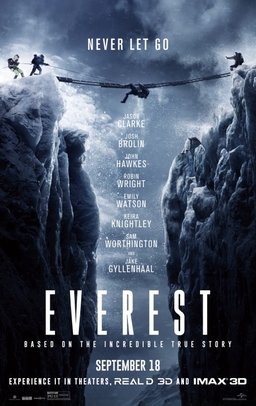
I have been wondering whatever happened to Stephen Daldry 's film project about 1996 Everest disaster. It was widely reported in media some years ago but then seemed to drop from the face of the earth, until at some point there were rumours about David Fincher directing it. Then about nothing, so at least I thought that it had become abandonware.
Not so, as apparently the film Everest will infact see the light of the day, albeit not with either Daldry or Fincher helming it. The director Baltasar Kormákur may not be that well known, but the cast consists of the A-listers Keira Knightley and Jake Gyllenhaal so the producing studio Working Title seems to be serious with this one (Budget is reported to be $65 million). Which is not something you could say about much earlier tv film about the same event based on Into Thin Air: A Personal Account of the Everest Disaster.Import1997Into Thin Air is a riveting first-hand account of a catastrophic expedition up Mount Everest. In March 1996, Outside magazine sent veteran journalist and seasoned climber Jon Krakauer on an expedition led by celebrated Everest guide Rob Hall. Despite the expertise of Hall and the other leaders, by the end of summit day eight people were dead. Krakauer's book is at once the story of the ill-fated adventure and an analysis of the factors leading up to its tragic end. Written within months of the events it chronicles, Into Thin Air clearly evokes the majestic Everest landscape. As the journey up the mountain progresses, Krakauer puts it in context by recalling the triumphs and perils of other Everest trips throughout history. The author's own anguish over what happened on the mountain is palpable as he leads readers to ponder timeless questions.0385492081. Working Title is best known for romantic comedies like Notting Hill so it's definitely interesting to see what they can make with the subject matter worlds apart.
As the movie is said to be based on Into Thin Air: A Personal Account of the Everest Disaster.Import1997Into Thin Air is a riveting first-hand account of a catastrophic expedition up Mount Everest. In March 1996, Outside magazine sent veteran journalist and seasoned climber Jon Krakauer on an expedition led by celebrated Everest guide Rob Hall. Despite the expertise of Hall and the other leaders, by the end of summit day eight people were dead. Krakauer's book is at once the story of the ill-fated adventure and an analysis of the factors leading up to its tragic end. Written within months of the events it chronicles, Into Thin Air clearly evokes the majestic Everest landscape. As the journey up the mountain progresses, Krakauer puts it in context by recalling the triumphs and perils of other Everest trips throughout history. The author's own anguish over what happened on the mountain is palpable as he leads readers to ponder timeless questions.0385492081 it will be interesting to see what they make out of the debacle that followed the tragic incident. Namely Jon Krakauer questioned a lot of actions of Anatoli Boukreev, who was the head climbing guide of Scott Fischer 's team. Accusing him of recklessness and abandoning his clients, even being the cause of some of the deaths. Later some of the 'facts' presented by Krakauer have revealed to have been liberal with the truth. Boukreev's point is backed of by the fact that a grand total of none of his clients lost their life. Krakauer's view is strongly opposed by many climbers, such as Galen Roswell, Simone Moro and Lene Gammelgård (the latter was part of the climb) as well as American Alpine Club. The latter honored Anatoli Boukreev with its highest award. The very prestigious David A. Sawles award, conferred only nine times in the previous 16 years, is given only to climbers who have "distinguished themselves, with unselfish devotion at personal risk or at sacrifice of a major objective, in going to the assistance of fellow climbers." If the movie's position is anything like to Into Thin Air's, I highly recommend reading also The Climb: Tragic Ambitions on Everest.Pan Books2002The Climb is Russian mountaineer Anatoli Boukreev's account of the harrowing May 1996 Mount Everest attempt, a tragedy that resulted in the deaths of eight people. The book is also Boukreev's rebuttal to accusations from fellow climber and author Jon Krakauer, who, in his bestselling memoir, Into Thin Air, suggests that Boukreev forfeited the safety of his clients to achieve his own climbing goals. Investigative writer and Climb coauthor G. Weston DeWalt uses taped statements from the surviving climbers and translated interviews from Boukreev to piece together the events and prove to the reader that Boukreev's role was heroic, not opportunistic. Boukreev refers to the actions of expedition leader Scott Fischer throughout the ascent, implying that factors other than the fierce snowstorm may have caused this disaster. This new account sparks debate among both mountaineers and those who have followed the story through the media and Krakauer's book. Readers can decide for themselves whether Boukreev presents a laudable defense or merely assuages his own bruised ego.0300488961.
- Everest (2015 film). At Wikipedia.
- Everest (2013). At Rotten Tomatoes.
- Jan Arnold breathless at big screen adaptation of Everest tragedy. A Nelson doctor whose husband died on Mt Everest says a trailer for a movie telling the story of the tragedy "left her breathless". By Sally Kidson at Stuff.co.nz on 2015-06-06.
- Remembering an Everest hero. An appreciation of recently deceased mountaineer Anatoli Boukreev, whose role in the 1996 Mount Everest tragedy remains a controversy. By Suzette Lalime at Salon-com on 1988-01-16.
- Krakauer vs Boukreev. By Nick van der Leek at HI-REZ Life on 2005-05-17.
- What Really Happened In The Thin Air. "Scott Fischer's guides Anatoli Boukreev and Lopsang Jangbu Sherpa responded to Outside's story, Into Thin Air by Jon Krakauer, by sending The Mountain Zone their version of the events on Mount Everest. Krakauer, by email, subsequently addressed the points they raised." At Mountain Zone.